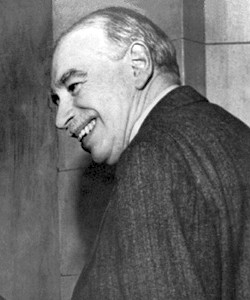

I followed a recent email discussion about Judge Richard Posner’s 2009 article in the New Republic in which he tried to revive John Maynard Keynes‘s contributions to macroeconomic understanding.
Jeff Hummel, as per usual, had some cogent comments:
I read this and found it somewhat interesting. Posner does a fairly good job explicating Keynes’s General Theory (although I think I did a more persuasive job of making Keynes’s theories plausible when I taught intermediate and graduate macro). But except for Posner’s complaints about mathematics and his emphasizing the distinction between risk and uncertainly, I think he was quite unfair to mainstream economists. Posner is obviously grossly unfamiliar with the actual views of mainstream macroeconomists . For example, a fall in money’s velocity is precisely equivalent to what Keynes means by hoarding or passive saving, and nowadays nearly all macro and monetary economists, including even Austrians such as George Selgin, Lawrence H. White, and Steve Horwitz accept that negative velocity shocks can cause recessions. Almost the only major features of Keynes’s theory that aren’t incorporated in New Keynesian approaches are an interest-inelastic consumption function, full price rigidity, and a self-generating deflationary cycle.
I still consider the best exposition of Keynes’s views is in Roger Garrison’s Time and Money: The Macroeconomics of Capital Structure. It is the only exposition I’ve seen (I haven’t read Skidelsky) that shows how the more socialist parts of The General Theory smoothly integrate with the rest of Keynes’s views. Garrison also offers one of my favorite quotations about Keynes, not in his book, but in an article. He writes that Keynes argued:
Wage rates (1) will not fall because of unions or wage rigidities inherent in the market process, or (2) will fall but without making matters any better and possibly making matters worse because of the accompanying fall in the price level, or (3) should not be allowed to fall because of considerations mentioned in (2).
And then in a footnote, Garrison adds:
Keynes appears to be adopting a strategy usually confined to the legal profession: “My client didn’t borrow your urn; it was in perfect condition when he returned it: and it was already broken when you lent it to him.
See Keynes’s bio and Keynesian Alan Blinder’s entry on Keynesian Economics in The Concise Encyclopedia of Economics.

READER COMMENTS
William Anderson
Jul 22 2020 at 6:49pm
The General Theory as a form of Kettle Pleading!
Scott Sumner
Jul 22 2020 at 7:07pm
I agree with Hummel. I find that really smart people (and Posner is really smart) have a bad habit of assuming they can briefly glance at macro and explain to those of us who have been studying it for decades about all the foolish errors we are making.
There are certainly many flaws with mainstream macro, but if you assume that macroeconomists are making a lot of silly errors then you might want to take a second look at why they hold these beliefs.
Mark Z
Jul 22 2020 at 8:32pm
This is a nice summary of why I don’t see how one can reconcile Paul Krugman’s concept of a ‘paradox of flexibility’ (which as I understand it is basically what (2) is) with the rest of Keynesianism. Price stickiness and price flexibility can’t both be the problem.
George Selgin
Jul 23 2020 at 9:43am
For the record: despite what Jeff Hummel says, and with all due respect to Steve and Larry, I don’t call myself or like being called an “Austrian” economist, and especially so for the purpose of demonstrating that “even Austrians” recognize this or that, when in many cases the truth is that many, if not most, do not. Just in the last two weeks I’ve criticized several “Austrian” works that deny that there’s such a thing as “velocity” of money, let alone that it can change in such a way as to prevent growth in M from leading to higher prices.This recent Frank Shostak post is typical: https://mises.org/wire/rising-demand-money-wont-save-us-inflation.
If others want to save the Austrian brand’s reputation from the pervasiveness of this sort of nonsense, good luck to them. But let them try to do it without making me a party to what I personally have for some time now considered a lost cause.
Roger McKinney
Jul 24 2020 at 10:25am
Yeah I agree. Shostak was off with this: “However, instead of consuming money, people demand it in order to exchange it for goods and services.”
Mises and Hayek showed that people demand cash because of uncertainty.
In a conversation on your blog months ago you gave me a link to a very good Fed article on the topic. It’s in the article I linked to above. One point impressed me the most: People will hold more cash with low interest rates because the opportunity cost of holding cash falls almost to zero
Roger McKinney
Jul 24 2020 at 10:16am
Seems to me that most Austrians don’t deny velocity as much as they deny that it is independent. Austrians want to know what causes velocity to fall. If something is causing velocity to fall, then falling velocity is a symptom and not a cause. Velocity falls because consumer want to hold more cash and they want more cash because uncertainty has increased because many have lost their jobs. I explained it better here https://finance.townhall.com/columnists/rogermckinney/2020/05/08/are-we-headed-for-inflation-deflation-or-stagnation-n2568448
Comments are closed.